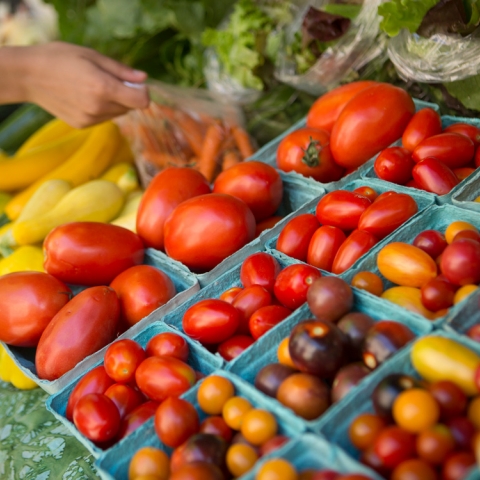
Cornell Campus Sustainability Office | Spring 2018
What practical things can we do in our daily lives to protect our living environment, save money, and contribute to good jobs for people in our community?
We’ve done the research alongside our partner (former) Get Your GreenBack Tompkins and these steps in the areas of local food, building energy, waste reduction and transportation are a great place to start. The Sustainability Life Recipes series will focus on ways to save money, go green, and learn about resources to support your journey. Have an idea? Send us a note at sustainability@cornell.edu
What better way to know your food and get it fresh than by growing your own! Even if you rent and have no space to plant, there are ways to cultivate your green thumb. Growing food is not without challenges, but for those who are interested and are willing to get their hands dirty, there is a lot of support around, especially at Cornell Cooperative Extension. Call the Growline for expert support at (607) 272-2292, or learn the basics through the Seed to Supper training. Or visit the online forum for home gardening in Tompkins County, accessible below.
WHO SHOULD GROW THEIR OWN?
While everybody should at least find a container or an old boot, fill it with soil, and grow some lettuce on a windowsill, those who are likely to be most successful are those have time to do the required work. Preparing the soil, building a deer fence, planting, weeding, watering, fertilizing, harvesting--there is always something to do.
WHERE & HOW CAN I GROW MY OWN?
There are several options, depending on where you will grow your plants:
-
Bucket garden. This is a great option for beginners, and for those who don’t have space. Tompkins Community Action and CCE-Tompkins often hold workshops and help people with limited incomes get started with gardening in the Spring. Check with them if you are interested.
-
Community garden. This is another great option if you don’t have land. There are many perks: a deer fence, tools, water, and a community of gardeners that can give you tips and lend you a hand. Here is a list of community gardens around the county.
-
Build a garden. The first thing you’ll want to do is build a deer fence.
WHAT TO GROW & WHEN TO PLANT?
What you choose to grow is up to you, your space, and taste buds. But here are some tips to help you decide:
-
Try some veggies that require little attention: lettuce and salad greens, zucchini, kale, green onions, tomatoes, basil and other herbs, potatoes.
-
Different plants need to be planted at different times. Here is a chart to help you determine when to plant here in Tompkins County.
-
Here is a chart showing the latest dates for planting for the Ithaca area.
-
There are local garden shops and nurseries that can supply you with seeds and plants to your hearts content.
-
CCE Tompkins has a free seed cabinet. Individuals are welcome to take up to 5 packs per visit. And to donate seeds as well.
COSTS AND SAVINGS?
If you are a beginner, you should not expect to see significant savings from the get-go. But as you gain experience you can learn how to grow more and more of the food you like. By learning to preserve their harvest, many local gardeners are finding they can provide themselves with healthy fruit and vegetables at a very low cost throughout the whole year.
GOT ADDITIONAL QUESTIONS AND/OR IDEAS?
-
Call the Growline, the gardener’s hotline at (607) 272-2292. Trained Master Gardeners at Cooperative Extension can answer even the toughest of questions.
-
This National Garden Bureau page contains a list of many useful resources.
